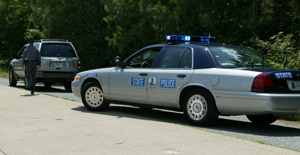Move It / Move Over Laws
Tips for Safe Driving in Virginia

Virginia’s traffic laws are similar to those in other states:
- Buckle up.
- Obey speed limits.
- Drive alcohol- and drug-free.
- Share the road.
- Avoid distractions.
- Don’t text and drive.
Virginia has two laws to keep vehicles moving safely and smoothly around traffic incidents – Move Over and Move It.
Virginia’s ‘Move Over’ Law
When approaching a stationary vehicle (1) displaying flashing red, blue or amber lights, or (2) that has activated its hazard warning lights, is displaying caution signs, or is marked with lit flares or torches, Virginia law (§ 46.2-861.1) requires that the driver of any motor vehicle*:
- Move Over: proceed with caution and, if reasonable, with due regard for safety and traffic conditions, yield the right-of-way by making a lane change into a lane not adjacent to the stationary vehicle; or
- Slow Down: if changing lanes would be unreasonable or unsafe, proceed with due caution and maintain a safe speed for highway conditions.
*The Move Over law applies only to vehicles operating on highways having at least four lanes with two of those intended for traffic proceeding in the same direction as the approaching vehicle.
The Move Over law does not apply in highway work zones. Depending upon the stationary vehicle, a violation is reckless driving or a traffic infraction.
Virginia’s ‘Move It’ Law
If you’re in a fender bender with no injuries and you can move your vehicle from the travel lanes, do so. It’s the law.
When you leave your vehicle on the road after a crash, you add to traffic back-ups, which may cause other more serious crashes in terms of property damage and personal injury.
Virginia’s “Move It” law (§ 46.2-888) states, “If the driver is capable of safely doing so and the vehicle is movable, (you) shall move the vehicle from the roadway to prevent obstructing the regular flow of traffic.”
The law adds that moving your vehicle does not relieve law-enforcement officers of their duty to file a report of the accident.
If You Are In A Crash
Check for injuries. If anyone is injured, call 911 immediately.
If no one is injured, and traffic is blocked, move the vehicles to the nearest safe location, then call 911.
Notify law enforcement when:
- There are injuries or fatalities
- Vehicles can’t be moved
- One of the drivers appears to be intoxicated
- Damage exceeds $1,500
- One of the drivers has no insurance
- One of the drivers leaves the crash scene
Warn oncoming traffic to prevent other crashes. Raise your hood or use flares.
If you need help:
- Tie a white handkerchief to your antenna or door.
- Wave a red flag.
- Use a flashlight at night.
Don’t become a pedestrian fatality on the highway. Be patient while waiting for help.
If you must leave your car, keep away from traffic and walk on the right side of the road.
Crossing a highway or trying to stop traffic is dangerous, especially at night or when visibility is low.
Exchange information. Everyone involved in a crash should share:
- Name
- Address
- Phone number
- Driver’s license number
- License plate number
- Vehicle make/model/year
- Insurance information
When calling 911 to report an accident, give an exact description of the crash location:
- Routes
- Streets
- City or county
- Distance to nearest landmark (exit number, mile marker, bridge, intersection, etc.).
From the Code of Virginia § 46.2-894:
Duty of driver to stop, etc., in event of accident involving injury or death or damage to attended property: The driver of any vehicle involved in an accident in which a person is killed or injured or in which an attended vehicle or other attended property is damaged shall immediately stop as close to the scene of the accident as possible without obstructing traffic, and report his name, address, driver's license number and vehicle registration number forthwith to the State Police or local law-enforcement agency, to the person struck and injured if such person appears to be capable of understanding and retaining the information, or to the driver or some other occupant of the vehicle collided with or to the custodian of other damaged property.



